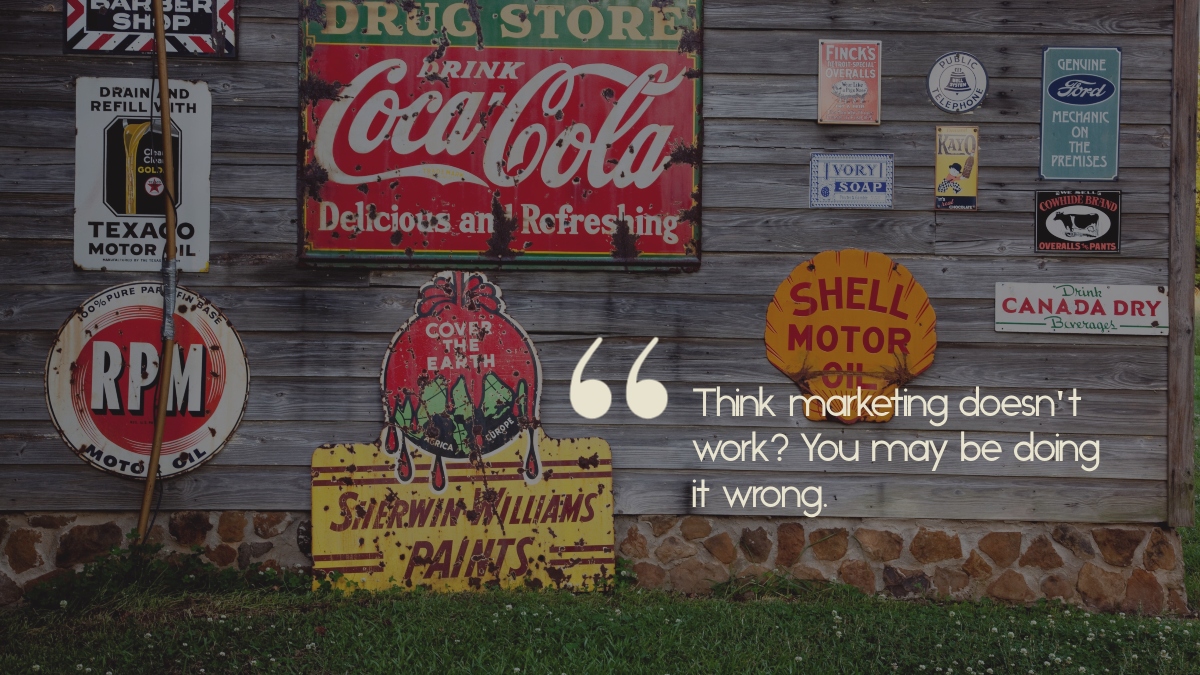Marketing doesn’t work! Or so we’ve heard.

One of the more common things we hear when talking to business owners is, “I’ve tried marketing before and it just doesn’t work.” Other variations are, “I’ve done Facebook marketing before and it didn’t work”, “I’ve tried search marketing and it didn’t work”, “I’ve tried email marketing and it didn’t work”… you get the idea.
And indeed, marketing ISN’T a magic cure-all that will instantly turn your business around, and so some of these comments definitely have a kernel of truth in them. Everything about running your own business takes work, and marketing is no exception.
How to tell if marketing really isn’t working for your business, and why.
But let’s break this down a little bit and tackle some of the most common reasons “marketing doesn’t work”.
- How do you know it’s NOT working? You’d be surprised how many times people tell us that marketing isn’t doing anything for them, but can’t give us specific, quantifiable data to back up their claims. They just have a vague sense of unease that they’re spending money and not getting a return on their investment. An old boss used to really irritate me with the saying “You can’t manage what you can’t measure”… but it’s very true. Ask yourself: “do I have specific tools and reporting I’m using on a regular basis to keep track of my results?”
- On that note, do you have specific goals you’re looking to achieve through marketing? You’d also be surprised how many times people launch marketing initiatives with no clue as to what they expect. They’re just hoping that their business “gets better”, whatever that means. Another boss saying applies here: “if you don’t know where you’re going, you probably won’t get there.”
- Are you using the right tool for the job? All marketing vehicles are not created equal. If you’re expecting to drive a bunch of online sales through a newspaper ad, you’re probably not going to succeed. If you’re running a Google Ads campaign to build your brand, for instance, you MAY succeed, but it’ll take a long time to get where you’re trying to go. Make sure you’re using the right tactics to achieve your goals. And make sure your personal bias doesn’t get in the way of making good decisions with your tactics: if you love Facebook, that’s great… but it may not be the best vehicle to achieve every goal. If I were to wedge another boss saying in here, it would be “If you have a hammer, everything looks like a nail.” Everything is not, in fact, a nail. There are rivets, screws, bolts, and a whole host of other fastening options out there. And they all do something different. The same concept applies to your marketing tools. Also, remember that the problem may not lie in the tool, but in what the tool links to. No digital marketing campaign that links directly to your website is going to work if your website isn’t effective enough to capture and convert that traffic. We often see people saying some digital campaign “didn’t work” when no effort was made to create an effective landing page, or even update their website to reflect the messaging in the ad.
- This brings us to the kicker: was your marketing done well? I hate to bring this up, but marketing is both an art and science, and it takes knowledge and experience to do well. We believe passionately that (almost) everyone can put together great marketing programs, but that doesn’t mean they can do it on the first try and without guidance. A poorly thought out, poorly executed, and poorly messaged ad usually won’t work. Especially if it sends people to a poorly thought-out, poorly executed, and poorly messaged website.
What to do of it: how to fix your marketing
OK, so now that we’ve identified a few of the issues we all face with marketing effectiveness, let’s take a look at some solutions/tips:
- Marketing measurement: There are a ton of great, free tools out there. Google Analytics is absolutely free and will tell you more than you can possibly imagine about how your website is performing, what your best customers look like, and a whole bunch of other cool stuff. Google Ads is chock full of data regarding your paid search campaigns. Facebook has an amazing dashboard that’s easy to use and extremely helpful when looking at your social media campaigns. I could go on and on, but the fact is that you really don’t need to spend a dime to get 85% of the data you could ever possibly need to run your business. Not running digital advertising? Stick a coupon in your newspaper ad and track them manually as they come in to your store. Old-school works here too!
- Marketing Goals: This doesn’t have to be tough to figure out. What do you need to make your business successful? More visits to your website? OK, now that you’ve got Google Analytics installed, since it’s FREE and it makes no sense not to have it, take a look at what your average traffic has been over the past few months. Set yourself a goal based on that. It doesn’t have to be super-scientific, just pick a number and then track it over time to see how you’re doing. You’ll get better over time at setting goals and figuring out what makes sense and is achievable for your business. Don’t sweat it too much upfront, just get started.
- Marketing Tools: This is one where you may want to get some outside help to figure out exactly how to achieve your shiny new goals. A few basic guidelines are as follows: Google Ads is a good way to drive traffic to your website from specific keywords/searches that are important to your business. Facebook pages (and other social media) are a good way to build awareness and engage with your customers with content, and Facebook ads are a good way to drive traffic to your website. Blogs are a good way to build awareness, position yourself as a subject matter expert, and help improve your website’s organic search rankings (SEO). This is by no means an exhaustive list of possible marketing tools and their best uses, but you get the idea.
- Marketing Execution: This is another place where outside help can be really important. Find someone with a lot of marketing experience to run your work by. Don’t rely on friends and family unless you have a marketing director among that group. Friends ‘n family is often just a focus group of a few, and they rarely bring you much insight. If an adviser isn’t available to you, do your research online: read articles on how to build a great ad, now to message things correctly, on how to build good landing pages, etc. Then TEST. If you are strict about testing things, you’ll start to build your own experience on what does, and does not work.
Seriously, sometimes the best way to figure out if your marketing is actually doing anything for you is to have an impartial third party take a look at what you’ve done. We’re always happy to do a quick audit for you- just let us know if we can help!
Happy small business marketing,
Theron & Katie
At Urban Sherpa Marketing Co. we offer marketing advisory, strategic planning, and services for small businesses and startups, including content marketing. Our goal is to make high-quality marketing possible for every business, no matter the size. Think of us as your outsourced marketing department, strategic marketing adviser, or even your phone-a-friend marketing lifeline.
Share this on:

